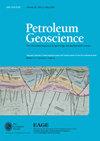对比海上盆地中页岩深度函数的比较以及CH4和CO2控制系统的密封性能
IF 2.1
4区 地球科学
Q3 GEOSCIENCES, MULTIDISCIPLINARY
引用次数: 2
摘要
将莫桑比克近海Rovuma盆地的泥岩压实趋势与挪威北海、墨西哥湾和印度尼西亚近海Kutai盆地的泥岩压缩趋势进行了比较。比较表明,埋藏率和裂谷作用的时间是造成观察到的差异的主要原因。Rovuma盆地的压实趋势与Kutai盆地和墨西哥湾的压实趋势大致相似,但与挪威北海的数据非常不同,后者显示出比其他三个盆地更高的孔隙度和更浅的超压开始。地震速度与深度的函数关系表明,Rovuma和墨西哥湾盆地之间有很大的相似性。然后,我们使用这些比较,使用泥岩渗透率预测函数和将渗透率映射到阈值压力的方法,对Rovuma盆地白垩纪泥岩的毛细管封闭潜力进行总体评估,从而可以估计CO2和CH4的最大柱高度,并具有不确定性范围。预测的CO2柱高度略小于等效CH4柱高度。其中一口井观测到的CH4柱高度明显低于泥岩渗透率预测的高度,这可能是由于其他因素,如压裂或气体从结构中运移。该比较表明,Rovuma盆地白垩纪页岩的毛细管密封潜力总体良好,并为从多个近海盆地的碳氢化合物密封数据集评估CO2储存潜力提供了一种通用方法。本文是能源地球科学系列的一部分,可在https://www.lyellcollection.org/cc/energy-geoscience-series本文章由计算机程序翻译,如有差异,请以英文原文为准。
Comparison of shale depth functions in contrasting offshore basins and sealing behaviour for CH4 and CO2 containment systems
Mudrock compaction trends from the Rovuma basin offshore Mozambique are compared with those of the Norwegian North Sea, the Gulf of Mexico and the Kutai basin offshore Indonesia. The comparison reveals that burial rates and timing of rifting are the dominant causes for the differences observed. The compaction trend for the Rovuma basin is broadly similar to the trends for the Kutai basin and the Gulf of Mexico, but very different from those for the Norwegian North Sea data, which show higher porosity and shallower onset of overpressure than those from the other three basins. The relationships for seismic velocities as a function of depth show strong similarities between the Rovuma and Gulf of Mexico basins.We then use these comparisons to make a general assessment of the capillary sealing potential of Cretaceous mudrocks in the Rovuma basin, using a mudstone permeability prediction function and a method for mapping permeability to threshold pressure, allowing estimation of maximum column heights for CO2 and CH4, with uncertainty ranges. Predicted CO2 column heights are slightly less than the equivalent CH4 column heights. The observed CH4 column height at one of the wells is significantly lower than that predicted from mudstone permeability, which is probably due to other factors such as fracturing or gas migration out of the structure. The comparison indicates generally good capillary sealing potential for the Rovuma basin Cretaceous shales and offers a general approach for assessing CO2 storage potential from hydrocarbon sealing datasets from multiple offshore basins.This article is part of the Energy Geoscience Series available at https://www.lyellcollection.org/cc/energy-geoscience-series
求助全文
通过发布文献求助,成功后即可免费获取论文全文。
去求助
来源期刊

Petroleum Geoscience
地学-地球科学综合
CiteScore
4.80
自引率
11.80%
发文量
28
审稿时长
>12 weeks
期刊介绍:
Petroleum Geoscience is the international journal of geoenergy and applied earth science, and is co-owned by the Geological Society of London and the European Association of Geoscientists and Engineers (EAGE).
Petroleum Geoscience transcends disciplinary boundaries and publishes a balanced mix of articles covering exploration, exploitation, appraisal, development and enhancement of sub-surface hydrocarbon resources and carbon repositories. The integration of disciplines in an applied context, whether for fluid production, carbon storage or related geoenergy applications, is a particular strength of the journal. Articles on enhancing exploration efficiency, lowering technological and environmental risk, and improving hydrocarbon recovery communicate the latest developments in sub-surface geoscience to a wide readership.
Petroleum Geoscience provides a multidisciplinary forum for those engaged in the science and technology of the rock-related sub-surface disciplines. The journal reaches some 8000 individual subscribers, and a further 1100 institutional subscriptions provide global access to readers including geologists, geophysicists, petroleum and reservoir engineers, petrophysicists and geochemists in both academia and industry. The journal aims to share knowledge of reservoir geoscience and to reflect the international nature of its development.
 求助内容:
求助内容: 应助结果提醒方式:
应助结果提醒方式:


